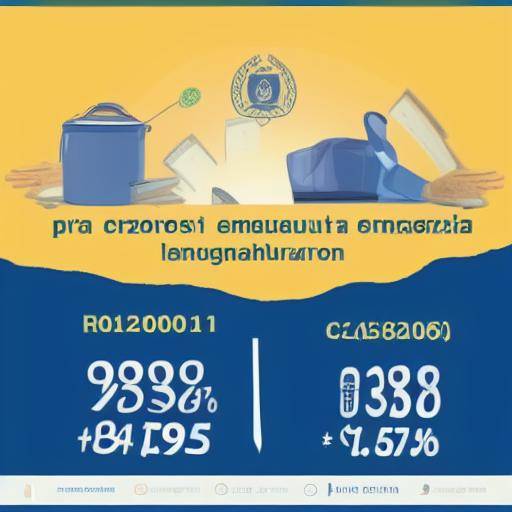
In current society, financial health is a crucial aspect that influences the quality of life of people. A fundamental part of this is the credit score, which reflects a person's ability to manage their finances and payment habits. In this article, we will explore the indicators of a good credit score and how this relates to financial health. From discipline in the management of personal finances to the continuous improvement of credit rating, we will break down the key aspects for a sound financial balance. Throughout this journey, we will discover the importance of maintaining a good rating, the discipline required to achieve it and how constant improvement can lead to optimized financial health.
Qualification and Importance
The term "qualification" refers to the score assigned to a person based on their credit history, payment habits, debts and other financial factors. Maintaining a good rating is crucial for accessing loans, credit cards and other forms of financing. In addition, a good rating can influence the interest rates a person receives when asking for a loan, which can result in significant long-term savings. The rating is widely used by financial entities to assess the credibility and financial responsibility of an individual.
Indicators of good credit score
Some of the key indicators of a good credit score include:
- Timely payment of debts, loans and bills.
- Maintenance of a low level of debt relative to the available credit limit.
- Solid and diversified credit history.
- Avoid opening multiple credit lines in a short period of time.
- Regular review and correction of credit reports.
These indicators form the basis for maintaining a healthy credit rating and are critical to long-term financial stability.
Discipline in Financial Management
Discipline is a determining factor in the effective management of personal finances. It implies the ability to set financial targets, create a realistic budget and maintain responsible financial habits over time. Discipline is essential to maintain a good credit score, as it involves making informed financial decisions and resisting the temptation of unplanned expenses.
Disciplined financial Habits: key to good credit score
The following financial habits are essential for maintaining discipline in financial management and, in turn, maintaining a good credit score:
- Set up a budget and stick to it.
- Save regularly for emergencies and long-term goals.
- Avoid the accumulation of unnecessary debts.
- Perform constant monitoring of expenditures and adjust the budget as necessary.
Financial discipline involves making conscious and planned decisions in all aspects of personal finance, which contributes significantly to a healthy credit score.
Continuous Improvement of Credit Rating
While maintaining a good credit rating is important, sometimes financial circumstances may temporarily affect the credit score. However, it is possible to improve credit rating through responsible financial practices and well-planned strategies. Continuous improvement of credit rating can open doors to better financial opportunities and long-term savings.
Strategies to improve credit rating
Some effective strategies for continuous improvement of credit rating include:
- Pay the debts on time and in full.
- Reduce outstanding balance on credit cards to a minimum.
- Avoid closing old credit accounts, as they contribute positively to credit history.
- Regularly review credit reports and correct possible errors.
- Responsiblely use the available credit to improve credit rating.
Conclusion
In short, credit rating, discipline in financial management and continuous improvement are key components for sound financial health. Maintaining a good rating, being disciplined in managing personal finances and constantly working on improving credit ratings are key steps towards long-term financial stability. In understanding these aspects and implementing effective strategies, people can achieve an optimal financial balance and build a solid financial future.
For more information and personalized advice on the management of credit rating and financial health, please do not hesitate to contact finance experts and consult reliable sources for additional guidance.
FAQs
What factors influence credit rating?
The credit rating is influenced by several factors, including the payment history, the level of indebtedness, the length of the credit history, the diversity of accounts and the number of recent credit queries, among others.
How does credit rating affect financial decisions?
A good credit rating can result in more favorable interest rates on loans and credit cards, which in turn can lead to significant savings over time. In addition, a good credit rating can influence the ability to obtain financing for important purchases, such as housing or automobiles.
How can I improve my credit rating if I have debts?
One way to improve debt credit rating is to prioritize payments on time and reduce the outstanding balance on credit cards. It is also essential to review and correct possible errors in credit reports, as well as to use credit in a responsible and moderate manner.
What if I have a limited credit history?
If you have a limited credit history, it is essential to establish a solid payment history, diversify your credit accounts if possible and avoid opening multiple accounts in a short period of time. You can also consider options as secured cards to build a credit history.
What kind of financial discipline is necessary to maintain a good credit score?
Financial discipline involves setting up and falling into a budget, avoiding unnecessary expenses, monitoring expenditures on an ongoing basis and saving for emergencies and long-term targets. It also implies the timely payment of debts and loans, as well as the responsible management of credit.
How long has credit rating significantly improved?
The time needed to significantly improve credit rating varies according to the individual situation, but in general, establishing responsible financial habits and implementing credit improvement strategies can lead to improvements in credit score over time.
These are just some of the key aspects related to credit rating, discipline in financial management and continuous improvement. For specific consultations or particular situations, it is advisable to seek professional financial advice.
With this, I hope you have found useful and practical information to keep you informed about how to achieve good credit score and sound financial health. Remember that financial stability is a continuous journey that requires focus, commitment and knowledge, but long-term benefits are invaluable!






















































